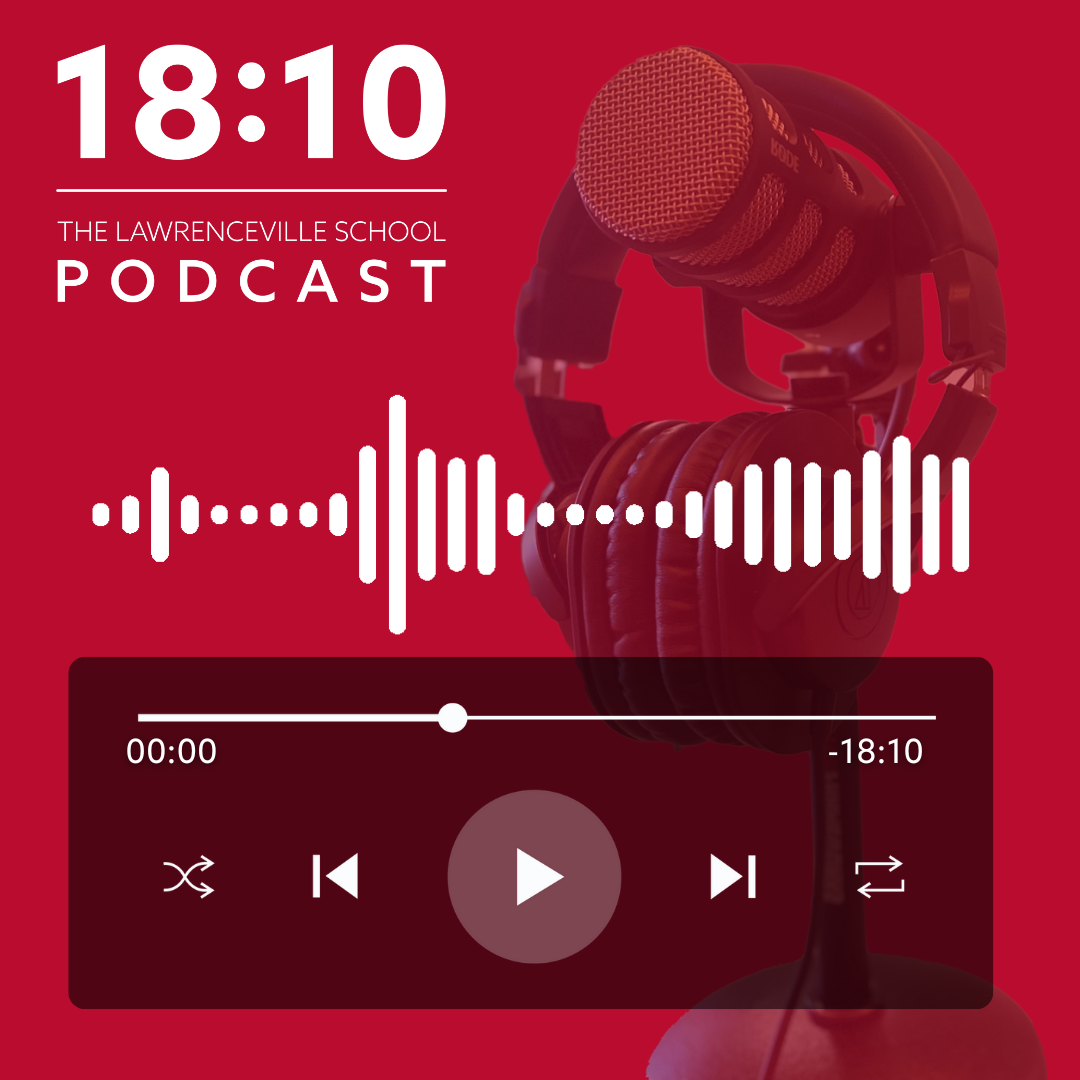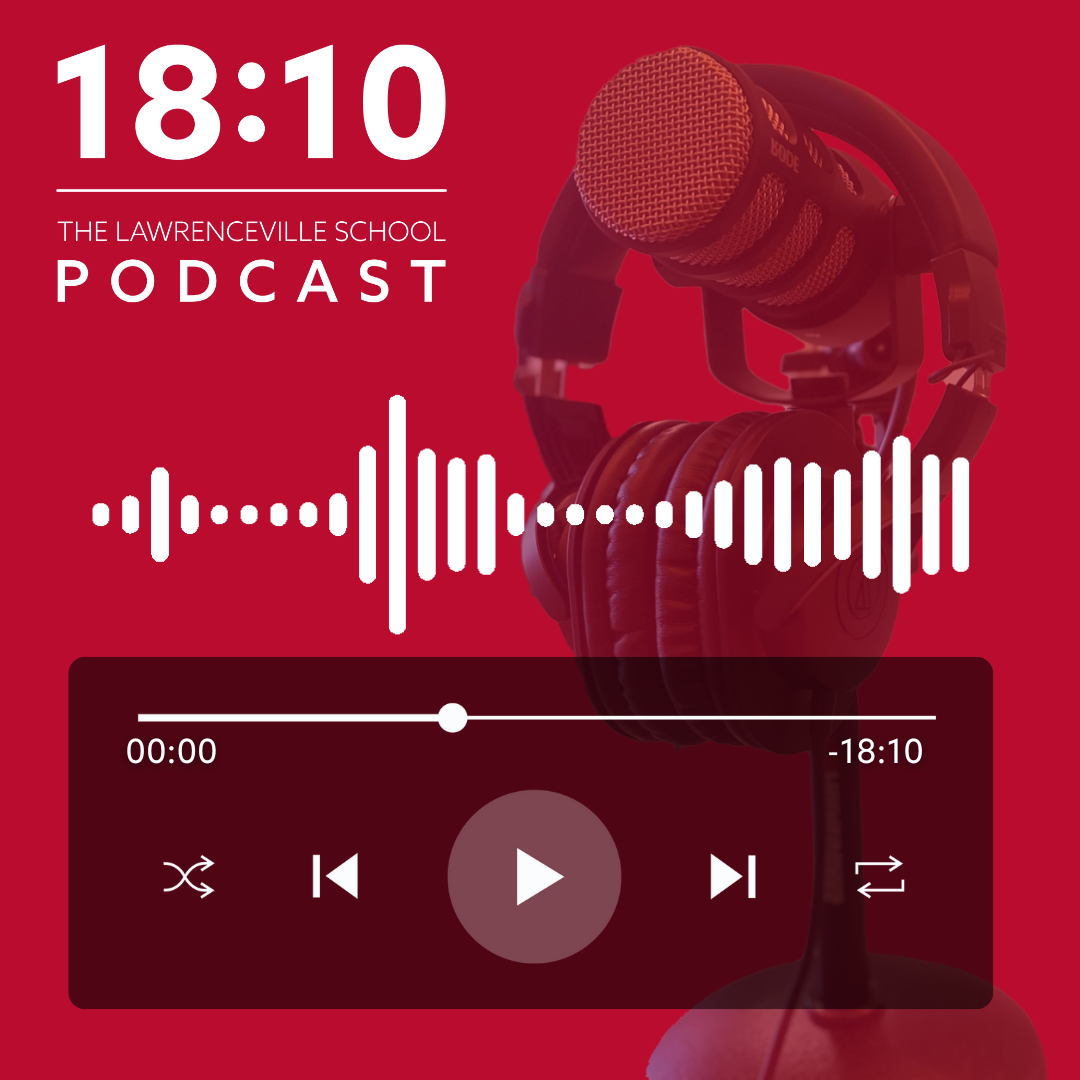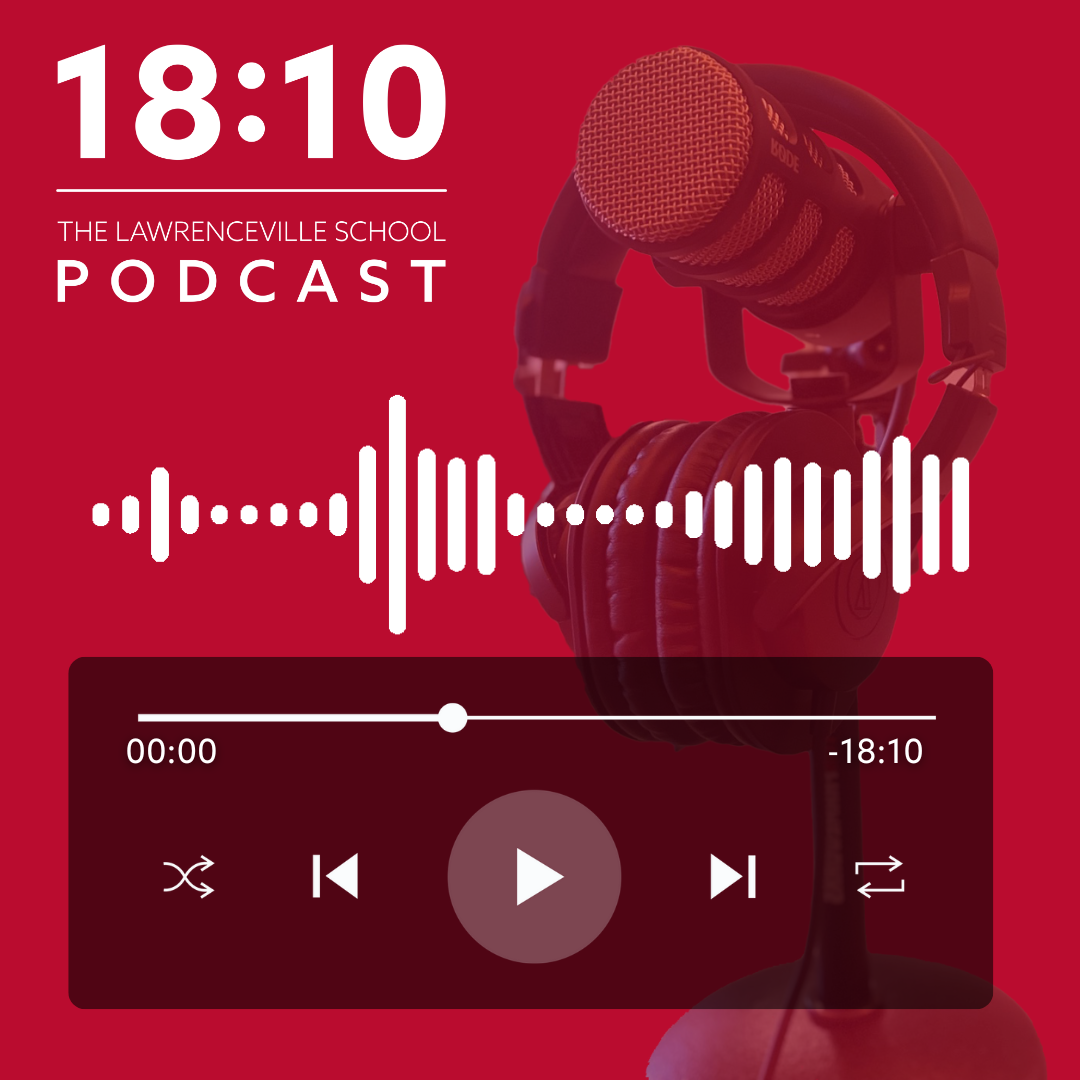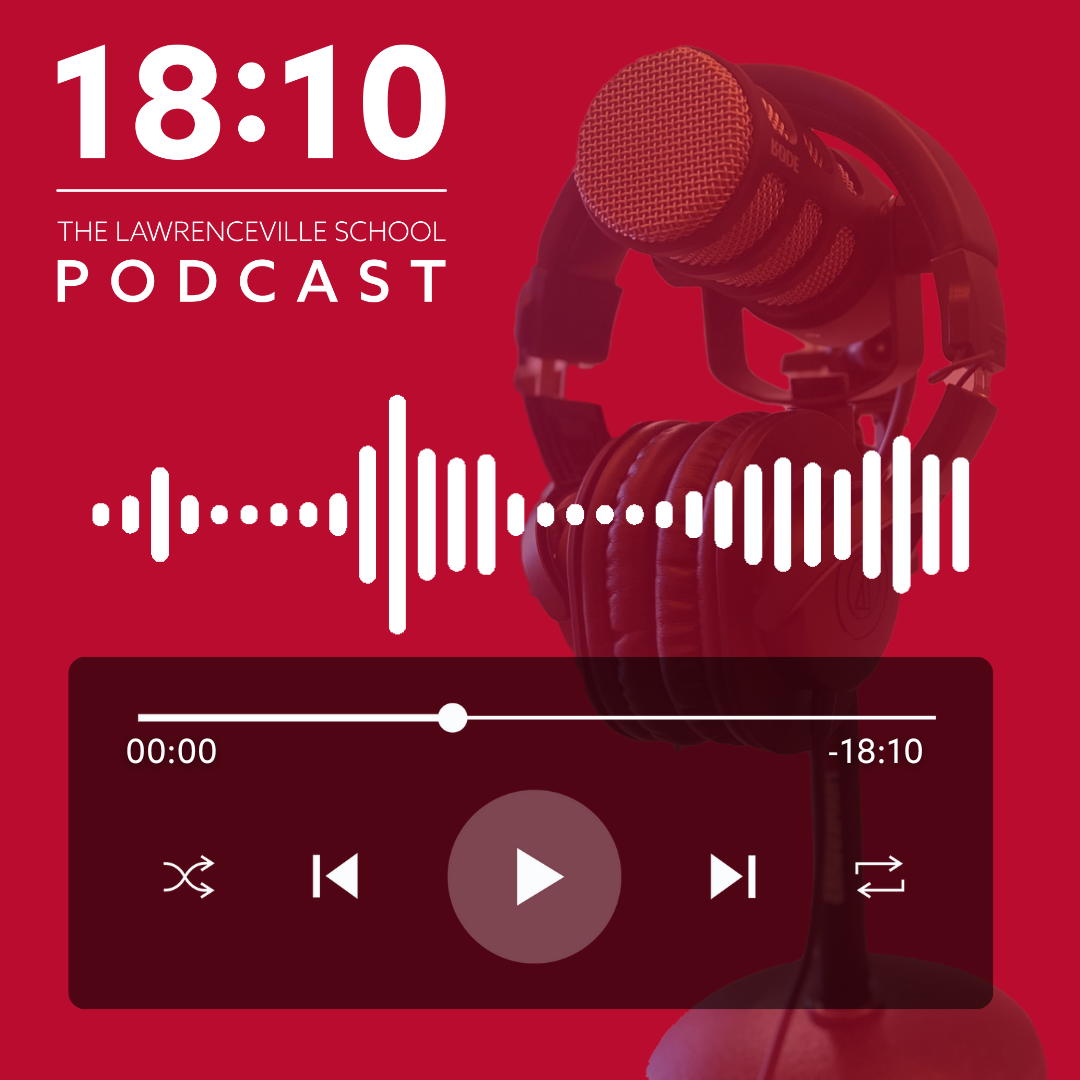Episode Transcript
[00:00:02] Speaker A: Welcome to 1810, a podcast produced by the Lawrenceville School. In 18 minutes and 10 seconds, we explore the future of education with insights from bright minded individuals, inspiring new ways of thinking.
[00:00:15] Speaker B: I'm Cameron Brickhouse, the dean of diversity, inclusion and community Engagement at the Lawrenceville School.
[00:00:20] Speaker A: And I'm Zaheer Ali, Executive Director of the Hutchins Institute for Social justice at the Lawrenceville School. And we are here to explore wokeness education and social justice in an independent school context.
So, Cameron, I think a good place for us to start is to just talk about the work that we do and how we understand our work.
[00:00:41] Speaker B: I think you should go first, Sahir.
[00:00:43] Speaker A: So I direct the Institute for Social justice at Lawrenceville and we understand social justice in three ways. As a subject of study, as a method of inquiry and analysis, and as an ethics of practice. And I like to think about this in terms of three questions. What do we know, how do we know it? And who are we as a result? That's just the basic way that we approach social justice, which I think is a little different than a lot of people's expectations.
I'm less interested or we've been less interested at the institute with particular politics or policies or perspectives that people have and really want to dive into this understanding of social justice broadly, but really lean into the methods of analysis and the ethics of being in community.
How do you see your work in this learning environment?
[00:01:33] Speaker B: I think we overlap a bit in terms of our methods in regards to how we frame our work. I think we're both very invested in values and how to organize people around values instead of identity.
So I see a lot of my work about perfecting skills to communicate across difference.
I see my work to be really anchored in developing community and community practices. I see community as a very active thing that we do. And I also am invested in producing global citizens, citizens who are invested in being ethical and invested in the world around them and who are curious.
[00:02:18] Speaker A: I really like this idea of values over identity.
You know, I like to say identity is an important element of who we are. Identity as a foundation, but not a container.
[00:02:29] Speaker B: I really like what you've said before about identity to be a box to stand on. Can you say more about that?
[00:02:37] Speaker A: This idea that identity is a box that we stand on but that we are not in, Right? That you don't put us in. And so, um, it's a foundation we stand on. It's not a container. It's part of who we are. It is a foundational part of who we are, but it Isn't all who we are. And in the context of social justice, how this plays out? I think identity is oftentimes a really important and powerful way for people to organize and build solidarity. But then it can become exclusive. Right. And I like to talk with the students that we work with.
You know, if you organize around identity, how do you reach people who don't share your identity?
If you organize around even experience, how do you reach people who don't share your experience? Right. So like, we do this exercise, I'm like, who's opposed to or wants to help address hunger or food insecurity? And everyone will raise their hand. And then I'm saying, well, who here is hungry? No one. Right. And so you don't have to have an identity, shared identity, or a shared experience to have to have a shared value. And so it doesn't mean that identity isn't important. It doesn't mean that experience isn't important, but those are things that we stand on that we don't stand in. Right. And so I really like this idea. And I think that's where both of us really meet in terms of our work. And I think it's also where our work is misunderstood. Right. Because I think there's a lot of misunderstanding about the way that people do social justice or the way that people think about diversity and inclusion and community engagement. And certainly that misunderstanding exists among people who aren't doing this work. But I would say it also exists among people who are doing the work. Cause we're a little bit, I would say, unorthodox from some of the ways that we've seen this work play out in the field.
[00:04:32] Speaker B: Right? Yeah, yeah. Cause I think we're both very invested in critical engagement and skills and discourse. Right. I think what also makes us nimble and different is our investment in this idea of rigor, which can be misunderstood. Right. Which I'd like to talk to you a bit more. But like, we believe in a rigorous engagement with ideas and with methods we believe in. It's important to have rigorous discourse in order to advance this work. And sometimes I don't see that with some of our other colleagues.
[00:05:09] Speaker A: Well, I think that's a good way for us to get into this issue of woke and, and the way WOKE has been problematized. And certainly your work and the kind of work that you do in your field. The work that I do in my field has often been mischaracterized and caricatured as quote, unquote, woke in a way meant to dismiss the value of what we do. And so I think it's important for us to kind of revisit this concept of woke. And I think, you know, in our conversation leading up to this one, we started going back through the history of this term, woke, and this concept and found some really interesting things.
[00:05:52] Speaker B: Right. I mean, things that were surprising to me. I knew woke had a really rich history that has been distorted. And, you know, woke is now Frankenstein's monster.
[00:06:01] Speaker A: We're both historians.
[00:06:02] Speaker B: Yes. That's an important framing.
[00:06:05] Speaker A: We always start with what is the history of this?
[00:06:08] Speaker B: Right. Where did this come from?
[00:06:09] Speaker A: How do we get here? Exactly. So let's dive into some of the history of woke that surprised even us.
[00:06:17] Speaker B: So I had no idea that it really. The first mention of Woke was in 1938 from a Ledbetter song about the Scottsboro Boys. And it was a protest song. And Ledbetter says, so I advise everybody be a little careful when they go along through Alabama. Stay woke. Keep their eyes open.
And I was like, oh, I think.
[00:06:42] Speaker A: It'S important for us to, like, first let people know who the Scottsboro Boys were. And in a quick overview, the Scottsboro Boys were nine young black men from.
[00:06:52] Speaker B: 12 to 19 years of age. So young. Young.
[00:06:54] Speaker A: Right. Who were accused of raping a white woman and were sentenced to death.
[00:07:00] Speaker B: Yes.
[00:07:01] Speaker A: And their case became one of those causes that illustrated the injustices in the criminal legal system. Right. Many different organizations and movements began organizing.
[00:07:14] Speaker B: Around this constitutional and built coalition. Exactly. And again, those coalitions were built around a set of values. Right?
[00:07:20] Speaker A: That's right.
[00:07:21] Speaker B: Having equal justice for all.
[00:07:23] Speaker A: That's right.
So the word woke is introduced here.
[00:07:26] Speaker B: Yeah. Through Huddie ledbetter bluesinger in 1960.
[00:07:30] Speaker A: Stay woke.
[00:07:31] Speaker B: Yes. Keep their eyes open as you go through Alabama.
[00:07:35] Speaker A: And we found other instances throughout history of woke showing up.
[00:07:41] Speaker B: So we have Marcus Garvey, early 20th century activist, who I guess we could describe him as being Pan Africanist.
[00:07:50] Speaker A: Yes.
[00:07:50] Speaker B: And nationalist separatist.
[00:07:52] Speaker A: The largest black mass movement in the 20th century was led by Marcus Garvey. Marcus Garvey, Universal Negro Improvement association, who stated, wake up, Ethiopia. Wake up, Africa.
We were asleep, but we will stay woke from now on. So again, showing this long history of woke.
And then in 1940, the Negro mine workers in their statement, we were asleep, but we will stay woke from now on, advocating against discriminatory pay. So this woke is showing up throughout the century.
[00:08:27] Speaker B: Right, Right.
And then it continues. Right.
In 1962, there's this essay by William Melvin Kelly in the New York Times, and he's a Harlem based writer, and the title of the essay is if you're woke, you dig it. And he starts really thinking about the ways that woke has been deployed across many different populations and the way it has been distorted and appropriated and separate it from its original meaning and its, you know, richness in a history of seeking justice, equality, et cetera. So that's also really important to think about that. We're already talking about cultural appropriation and misuse in the 1960s.
[00:09:12] Speaker A: Wow.
People might think, oh, we're coming up with these obscure historical examples that maybe they have not heard of before.
Let's, let's, let's go with Martin Luther the King. In 1965, Dr. King gave a speech at Oberlin titled Remaining awake through a great Revolution.
And in this address at Oberlin College, he gave these three things that were necessary for us to remain awake through a great revolution. And one was he said, quote, we are challenged to achieve a world perspective. And that goes to that global citizenship that we've been talking about. He wrote, we must work passionately and unrelentingly to get rid of racial injustice in all its dimensions.
And we must get rid of violence, hatred and war. And said, if we all learn to do this, we in a real sense will remain awake through a great revolution. If you had asked me before our dive through this history where awake or woke comes from, I would have said Spike Lee. Cause that's my reference point. I remember in School Days, which was released in 1988, the character played by Laurence Fishburne opens with or has this scene, I think, either opens or closes with wake up. Like yelling wake up. From the college quad. And this theme of waking up, this motif appears in almost every one of Spike Lee's movies in do the Right Thing in Jungle Fever and Mo Better Blues in Chirac. So if you had said to me, like, where does woke come from? I would say, well, I would say Spike Lee before having known this history.
[00:11:00] Speaker B: And I think I would have thought about Spike Lee. But, you know, I'm a little different generation.
For me, it probably would have been Erykah Badu and her usage of woke and this emphasis on the third eye and being aware of in her songs and in the way she sell fashions. That's probably where I would have been, right? I would have been like, you know, late 90s.
[00:11:26] Speaker A: So with this rich, deep history, cultural history, political history of this idea of woke or being awake or being aware, how do we get to where it becomes so mischaracterized so much so that I in fact went digging into my own social media past and I found a post that I made, I think on Facebook, dated February 8, 2016.
And I said, quote, I hate the word woke there. I said it for how it is deployed to suggest a binary of enlightenment and unenlightened, for how it lends itself to self righteousness and arrogance.
And I think by that time I had seen the term being used in a way that didn't promote the things that I thought this rich history would have promoted. The kind of awareness, the opening of space for solidarity, but rather was a way to delineate who was woke up and who was not.
[00:12:37] Speaker B: But also I think, not even being clear about organizing around a principle or a mission or a value. Right. Just I think, to your point of being like, who's in, who's out, who adheres to a certain way of being thinking, et cetera, and who doesn't.
But I mentioned this word of Frankenstein's monster before.
But it's not just isolated to one group of people.
I think it's across the board.
[00:13:08] Speaker A: Right.
[00:13:08] Speaker B: Like it morphed and was taken out of context and stripped of its meaning for so many groups of people. So, you know, and I'll be quite explicit, right. It's not. We're just not talking about like conservatives. Right. We're talking about black folks who actually started developing this term also not really imbuing it with its richness and acknowledging its possibility for organizing.
[00:13:37] Speaker A: Yeah. You know, as I, as I think back at this quote, and I was like, oof, you know, I'm gonna be generous with myself and say that I think what I intended from this quote was to call us back in an intra communal way, to the best of the tradition, at least, even if I knew it as a limited tradition.
[00:13:57] Speaker B: And let's name that tradition. Right. Like that tradition is advancing goodness. Right. Which is a Lawrenceville mission. Like part of the Lawrenceville mission. Advancing goodness, best for all, justice, fairness, equality, all of those things. That is what you mean by that phrase.
[00:14:15] Speaker A: Yeah. And I think what I think is a necessary critique from that place of the problems that I think developed around this idea of how wokeness was being deployed was then exploited in an intellectually dishonest but quite politically effective way.
Right.
Which has gotten a lot of people's backs up against the wall. Right, Right. Unfairly so.
[00:14:47] Speaker B: Yes.
[00:14:48] Speaker A: Right. And I don't think that we need to unpack all of the different ways from different sectors that have used woke now as a slur, as a way to shut down conversations, especially conversations around justice, conversations around community and inclusion. Right? And I think we're in a climate where woke has been so laden with baggage that other people have put on it unfairly.
[00:15:23] Speaker B: I mean, my question is, can you actually reclaim and deploy this term, or is this a term that we just relinquish and move on and do the work? Right? Is this a term that has been so adulterated that it can't be purified just a little bit? You know?
[00:15:41] Speaker A: You know, and I think if this were just about individuals debating a term, it would be okay.
But we also have to talk about elite capture.
My way of understanding this is elite institutions that have no intention of undergoing the kind of work that is involved in fundamental transformation will take up a term that suggests that transformation.
But so water it down and use it as a badge to say like, we've changed. Right? So I saw this in 2020 with all of these corporations and other kinds of institutions posting up black squares, issuing these statements, a kind of virtue signaling.
And so made this term, and this specifically woke, you know, something that actually lost its transformative teeth, its inability to do the transformative work that the naacp, that Marcus Garvey, that Martin King would have imbued the word with, then became a kind of badge for institutions who had no real either understanding or interest in doing that work to still claim it. And so what we ended up with is a real sanitized, superficial, tokenized form of this idea of this word.
In the next part of this conversation, Cameron and I dive deeper into the ways we have applied the best of these principles through Harkness Learning from us to you in 1810. We hope you enjoyed today's session and we look forward to our next exploration.
If you have comments or questions about today's episode, please reach out to communicationsrenceville.org we're always interested to hear your ideas.
A transcript of today's episode is available at elville1810.kastos.com 1810 is produced and edited.
[00:17:56] Speaker B: By the Communications Department at the Lawrenceville School School with Engineering by Sheyoun Aladesheh Special thanks to Jess Welsh, Andrea Fereshta, Lisa Gillard for inspiration and guidance.



